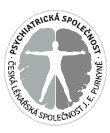Česká a slovenská psychiatrie

Časopis
Psychiatrické společnosti ČLS JEP
a Psychiatrickej spoločnosti SLS
souborný článek / review article
SPECIFICKÁ PORUCHA OSOBNOSTI JAKO DŮSLEDEK NEGATIVNÍCH ZKUŠENOSTÍ V PRŮBĚHU DĚTSTVÍ A DOSPÍVÁNÍ
SPECIFIC PERSONALITY DISORDER AS A RESULT OF NEGATIVE EVENTS IN CHILDHOOD AND ADOLESCENCE
Slavomil Fischer2, Ilja Žukov1, Hana Kuželová3, Radek Ptáček1,4
1 Department of Psychiatry, 1st Faculty of Medicine, Charles University in Prague, Czech Republic
2 Faculty of Education, University J. E. Purkyně, Czech Republic
3 Department of Biology and Medical Genetics, 2nd Faculty of Medicine, Charles University Prague, Czech Republic
4 The Police Academy of the Czech Republic
2 Faculty of Education, University J. E. Purkyně, Czech Republic
3 Department of Biology and Medical Genetics, 2nd Faculty of Medicine, Charles University Prague, Czech Republic
4 The Police Academy of the Czech Republic
Podpořeno v rámci GAČR 406/09/0367; IGA UJEP a výzkumným projektem PRVOUK: P26/LF1/4.
SOUHRN
Fischer S, Žukov I, Kuželová H, Ptáček R. Specifická porucha osobnosti jako důsledek negativních zkušeností v průběhu dětství a dospívání
Obsahem článku je prezentace výsledků výzkumu, v jehož rámci byly zjišťovány souvislosti mezi negativními zkušenostmi v dětství a dospívání a následnými potížemi se společenským uplatněním. Stejná souvislost byla zjišťována ve vztahu k rozvoji antisociálních forem chování. Šetření byly podrobeny vybrané skupiny delikventní mládeže. Dosažené výsledky ukazují na statisticky významné souvislosti mezi traumatizací a následně sníženými adaptačnímu schopnostmi. Konstatujeme, že byly prokázány důsledky negativního vývoje v dětství a dospívání, které spočívají v celkově snížených schopnostech se později ve společnosti uplatňovat sociálně přijatelným způsobem. Tyto potíže dokonce mohou ústit až v typické příznaky specifických poruch osobnosti, a také v maladaptaci, kdy způsob seberealizace spočívá u šetřených osob v jiných typech strategií. Tyto strategie jsou pro normální společenské fungování nepotřebné. Při dosahování potřeb se bohužel jedná často o antisociální formy chování. Ze zjištění vyplývá, že traumatizace se může stát významnou příčinou nejen delikvence, ale také příčinou rozvoje specifické poruchy osobnosti. Zjištění a výsledky jsou využitelné pro forenzní psychologickou praxi. Jsou využitelné pro diagnostiku, a pro následnou terapeutickou práci s delikventní mládeží.
Klíčová slova: psychické týrání, emoční deprivace, traumatizace, agresivita, poruchy chování, specifické poruchy osobnosti, problémy se společenským uplatněním
SUMMARY
Fischer S, Žukov I, Kuželová H, Ptáček R. Specific personality disorder as a result of negative events in childhood and adolescence
The article is an analysis of antisocial behaviour of delinquent youth.The relationships between negative events in childhood and adolescence, and subsequent problems in self-realization were studied. The relationships were analyzed in relation to the development of forms of antisocial behaviour. Psychological characteristics in the selected groups of juvenile delinquents and a control group were compared. Methods based on RSTI (Risk Sophistication Treatment Inventory), HARE PCT (Hare Psychopathy Checklist), and TSC 40 (Trauma Symptom Checklist) were used. Statistically significant differences were observed between trauma and the subsequently lower adaptation skills and development of typical symptoms of specific personality disorders. The findings suggest that negative events in childhood and adolescence may be a significant predictor of personality disorders in adulthood. The findings are in accordance with previous studies. Clinicians and researchers should be highly aware of stress and trauma in childhood as a risk factor for later psychopathological development.
(Supported by GACR 406/09/0367, IGA UJEP)
Key words: psychological abuse, emotional deprivation, traumatization, aggression, behavioural disorders, specific personality disorders, problems to self-realization
INTRODUCTION
Specific personality disorder is a serious disturbance in individual personality structure and behaviour.1,2 Specific personality disorder is diagnosed when rigid and maladapted personality traits seriously impair the ability to work. Related problems lead to inappropriate problem-solving and impair functioning and self-realization. Specific personality disorder is almost always connected with social failure. It is persistent and generally has a permanent effect on almost every area of an individuals life.
People with specific personality disorders do not feel anxious, do not lose contact with reality, and have no motivation to change their behaviour, which has a negative effect on treatment. Impulsiveness, absence of guilt, egocentrism, and a permanent disrespect for social norms are typical features of dissocial personality disorder.2 The causes of the disorder are explained on the basis of genetic3 and biological influences4,5 and a hostile and negative environment in the family. Emotionally unstable personality disorder is manifested by difficulties in self-conception and self-esteem and difficulties in social relationships. The causes include an unstable family environment, frustration, and deprivation due to an extremely unstable, challenging, and hostile environment.2
It is difficult to distinguish biological causes6, 7, 8 from negative family environment. According to Cloninger,9 classical bio-criminological theories have several deficiencies, mainly in the interpretation of delinquent behaviour originating on the basis of biological factors. An unanswered question is how to correct unacceptable behaviour in the case of major effect of personal features on personality disorder development.10 The present article points to these connections.
Many studies have analyzed relations between psychic trauma and subsequent personality disorder.11, 12 One of the causes of personality disorder is trauma. Symptoms of dissocial, emotionally unstable, and persistent personality disorders have been investigated.13, 14
Few studies have focused on social employment as connected with trauma. Theoretically, the need of self-realization can influence, compensate for, or reduce the symptoms of personality disorder. From this point of view the results of the present study can be useful. According to several studies,13, 15 the most important goal is to find optimal therapeutic programs.
This article presents the results from research performed with the aid of a grant from the Czech Science Foundation, aimed to analyzing antisocial behaviour of delinquent youths. As results of negative events during childhood and adolescence, especially psychological abuse and deprivation, in practice we can observe generally lower levels of adaptability in individuals who were exposed to these stressful situations. They generally have problems with self-realization through socially acceptable means.
These adjustment problems may manifest as different forms of behavioural disorders. They often develop into various forms of antisocial behaviour. The most important include impulsiveness and aggression, addictive behaviour, delinquency and crime. Diagnosis of these problems is very important, especially if it is focused on individual perspectives: in terms of corrections of antisocial behaviour and social employment demands solving; as well as in the prognosis of social assertion and self-realization according to social norms and demands.
MATERIALS AND METHODS
Associations between negative development, previously described, and subsequent consequences of reduced adaptability were analyzed. Specifically, the following issues were compared:
- - Negative experiences during childhood and adolescence, mainly psychological abuse (trauma) and psychological deprivation
- - Symptoms of personality disorder (antisocial; emotionally instable; persistent)
- - Difficulties in partner relationships
- - Difficulties with working
- - Evaluation of general predispositions to socially acceptable self-realization.
Our own version of a personality questionnaire, using the foreign experience with the diagnostic methods RSTI (Risk Sophistication Treatment Inventory) 16, HARE PCL (Hare Psychopathy Checklist)17 and TSC 40 (Trauma Symptom Check List)18 were used for research.
To determine statistically significant differences in the investigated factors, Fishers LSD test was used at the significance level of α-0,05 (for multiple comparisons). Research was conducted in the juvenile population of delinquents and in a control group (N = 544; age 15-26 years):
- - delinquent youth in institutional and protective institutional care (N = 144)
- - young offenders - prisoners (N = 110)
- - individuals dependent on psychoactive non-alcoholic substances (N = 74)
- - unemployed individuals (N = 66), (control group on the question of self-realization versus personality disorder)
- - control group (N = 150)
RESULTS
The research found statistically significant differences among observed groups of delinquent youth, unemployed group and the control group. Effects of intensive, repeated and long-term neglect and psychological abuse (characterized as a significant psychological trauma) were found in delinquent individuals. Statistically significant differences were found among youths in institutional and protective institutional care, dependent individuals and prisoners. These differences depend on the age at which defence mechanisms (a displacement and more intensive development of personality disorder symptoms) were developed. (See Figure 1, 2).
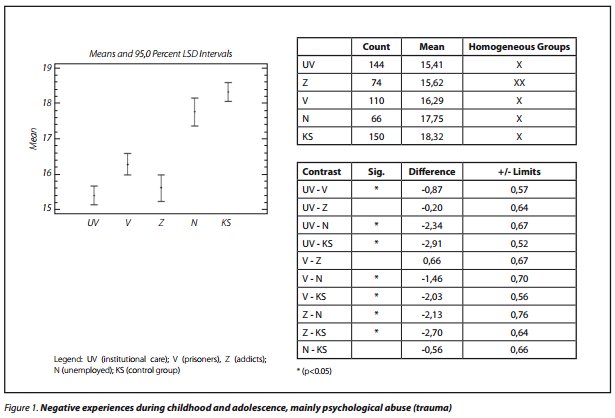
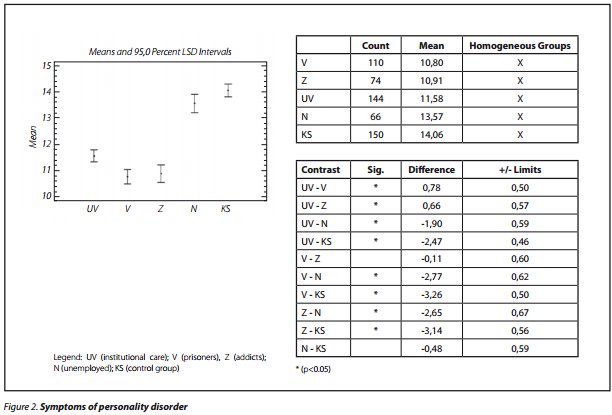
All groups of the delinquent population show symptoms of specific personality disorder. Anti-sociality and emotional instability are to the main symptoms, including: rationalization of own behaviour, feeling free to follow social standards, cunning and manipulative behaviour, lack of remorse or guilt, shallow emotional relationships and egocentrism, callousness, lack of empathy, aggression, impulsiveness, lack of self-control, and criminal tendencies. Equally as serious is the fact that in the researched individuals, persistent maladaptive features damaging interpersonal relationships and functioning in society and in employment (self-realization) were statistically significant. They are hostile or have a distrustful attitude towards the world, have feelings of emptiness and hopelessness, and a sense of constant threat and alienation from society.
The results point to problems in partner relationships, statistically significant in the delinquent population and in comparison to the control group and unemployed individuals. These findings can be interpreted as a result of personal features of delinquent individuals: low empathy, egocentrism, emotional shallowness and feedback in cases of problems with social employment (unemployment).
Problems with working are confirmed by previous studies, but they were not found in young individuals because they do not yet have much employment experience. The results point to the importance of comparisons between delinquent and control populations with unemployed individuals. This group has importance as a control group in assessment of differences in personality disorder symptoms and problems in relationships and self-realization in employment. The findings have the required validity.
Research findings clearly indicate that people with personality disorders have a distrustful attitude towards the world, feelings of emptiness and hopelessness, a sense of constant threat and alienation from society (reflected indefence mechanisms, particularly self-depreciation, and lack of faith in the possibility of achieving a socially acceptable position in society). Again, statistically significant differences were found.
The connections between trauma and its impact, which were emphatically verified, can be observed from correlations. The relationship between negative childhood and adolescent experiences and personality disorder symptoms were proved in the present study. Relationships were also found between these symptoms and generally lower social realization.
Statistically significant differences were found in observed delinquent youth compared to controls. The main reason for socially unacceptable behaviour is negative experiences from childhood and adolescence (psychological abuse and deprivation). Statistically significant differences were found in all groups: significant differences in all factors were found between the control group and delinquent youth. In unemployed individuals.difficulties were found in evaluation of general predispositions and working application, but without connections to other factors.
Statistically significant differences were found between offenders in the ability to engage in social interactions, but not in the control group and the unemployed. Unfortunately, desired forms of social self-realization were insufficient. For all groups of delinquent youths, there is substantial risk. The outlook is statistically more favorable for youths in institutional care, in which the important factor of "efficiency" of following institutional care is often discussed among experts.
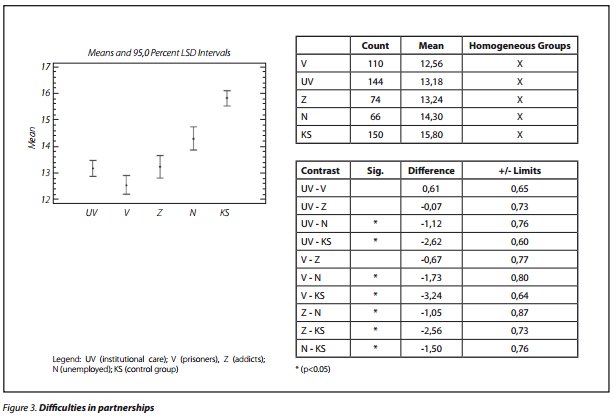
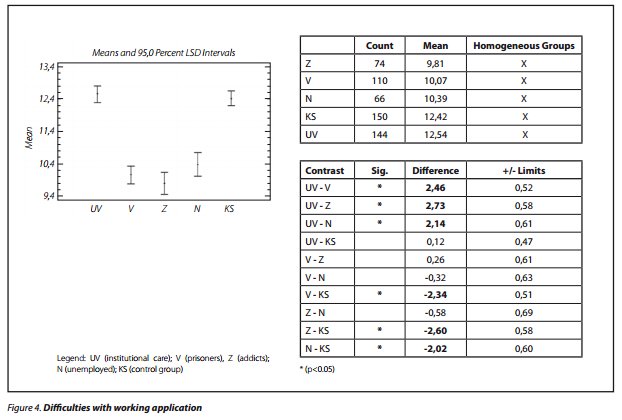
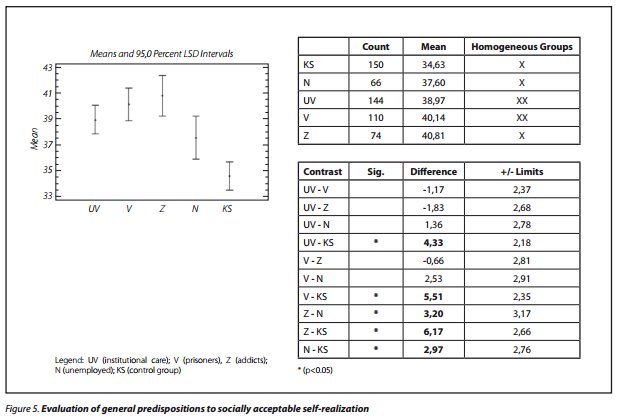

DISCUSSION AND CONCLUSION
During the study, statistically significant negative consequences caused by negative experiences in childhood and adolescence were observed; these stem from the generally poor ability to develop later in socially acceptable ways. These problems may develop into the typical symptoms of specific personality disorders, and thus cannot be attributed to brain damage or disease. They can be characterized as a permanent change in perception of and relationship to ones surroundings and in self-assessment, and in change in skills for self-realization in society. Ways of self-realization often consist of forms of antisocial behaviour.
Unfortunately, the prognosis for these individuals is poor. The findings indicate long-term effects of personality disorder as a result of trauma during childhood and adolescence. One possible solution, but with uncertain prospects, is long-term psychotherapy. This should focus on the correction of antisocial behaviour and compensating for the original underlying cause, but this is a very difficult goal. The prediction of an individuals subsequent social development could serve as a diagnostic instrument. The results of the present study should be useful in assessing the discriminatory ability of such an instrument.
LITERATURA
- 1. Cloninger CR, Svrackic DM. Personality disorders. In: Sadocs BJ, Sadocs VA (eds.). Kaplan and Sadocs Comprehensive Textbook of Psychiatry. Philadelphia, Lippincott: Williams and Wilkons; 2000: 1723-1764.
- 2. The ICD - 10. Classification of Mental and Behavioural Disorders. Clinical descriptions and diagnostic guidelines. Geneva, Switzerland: World Health Organization; 1992.
- 3. Zukov I, Ptacek R, Fischer S et al. Brain wave P 300. A comparative study of various forms of criminal activity. Medical Science Monitor 2009; 15 (7): 349-354.
- 4. Kuželová H, Ptacek R, Macek M. The serotonin transporter gene (5-HTT) variant and psychiatric disorders. Neuroendocrinology Letters 2010; 31 (1): 4-10.
- 5. Ptacek R, Kuželová H, Stefano G. Genetics in Psychiatry. Up-to-date Review 2011. Neuroendocrinology Letters 2011; 32 (4): 389-399.
- 6. Vevera J et al. COMT polymorphisms in impulsively violent offenders with antisocial personality disorder. Neuroendocrinology Letters 2009; 30 (6): 753-756.
- 7. Sustkova-Fiserova M, Vavrova J, Krsiak M. Brain levels of GABA, glutamate and aspartate in sociable, aggressive and timid mice: an in vivo microdialysis study. Neuroendocrinology Letters 2009; 30 (1): 79-84.
- 8. Pastucha P, Prasko J, Grambal A et al. Dissociative disorder and dissociation - comparison with healthy controls. Neuroendocrinology Letters 2009; 30 (6): 769-773.
- 9. Cloninger CR (eds.). Psychopathology and Personality. Washington: American Psychiatric Press; 1999.
- 10. Doren D. Understanding and Treating the Psychopathy. New York Wiley; 1987.
- 11. Herman JL. Childhood trauma in borderline personality disorder. American Journal of Psychiatryl989; 146 (4): 490-495.
- 12. Shea M et al. Commonality and specificity of personality disorder profiles in subjects with trauma histories. Journal of Personality Disorders 1999; 13 (3): 199-210.
- 13. Paris J. Does childhood trauma cause personality disorders in adults? Canadian Journal of Psychiatry 1998; 43 (2): 148-153.
- 14. Goodman N, New A, Siewer L. Trauma, genes, and the neurobiology of personality disorders. Annals of the New York 2004; 1032: 104-116.
- 15. Martens HJ. Multidimensional model of trauma and correlated personality disorder. Journal of Loss and Trauma: International Perspectives on Stress & Coping 2004; 10: 115-129.
- 16. Salekin RT. Risk-Sophistication-Treatment Inventory (RSTI) professional manual. Odessa, FL: Psychological Assessment Resources; 2004.
- 17. Hare RD. Psychopathy checklist-revised technical manual, 2nd ed. Toronto: Multihealth Systems, Inc.; 2003.
- 18. Briere J, Runtz M. The Trauma Symptom Checklist: Early data on a new scale. Journal of Interpersonal Violence 1989; 4: 151-163.

